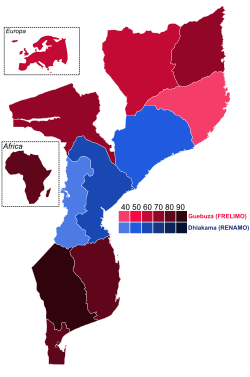 |
|---|
| Party | Votes | % | Seats | +/– |
|---|
| FRELIMO | 1,889,054 | 62.03 | 160 | +27 |
| Renamo-UE | 905,289 | 29.73 | 90 | –27 |
| Party for Peace, Democracy, and Development | 60,758 | 2.00 | 0 | New |
| Party of Freedom and Solidarity | 26,686 | 0.88 | 0 | New |
| National Reconciliation Party | 18,220 | 0.60 | 0 | New |
| Independent Party of Mozambique | 17,960 | 0.59 | 0 | 0 |
| Mozambique Social Broadening Party | 15,740 | 0.52 | 0 | 0 |
| Labor Party | 14,242 | 0.47 | 0 | 0 |
| Social Liberal Party | 13,915 | 0.46 | 0 | 0 |
| Ecological Party-Land Movement | 12,285 | 0.40 | 0 | New |
| United Front for Change and Good Governance | 11,059 | 0.36 | 0 | New |
| Democratic Union | 10,310 | 0.34 | 0 | 0 |
| Greens Party of Mozambique | 9,950 | 0.33 | 0 | New |
| Liberal and Democratic Party of Mozambique | 9,263 | 0.30 | 0 | 0 |
| Democratic Reconciliation Party | 9,026 | 0.30 | 0 | New |
| Union for the Salvation of Mozambique | 8,661 | 0.28 | 0 | New |
| Broad Opposition Front | 7,591 | 0.25 | 0 | New |
| Mozambique Democratic Liberal Party | 3,720 | 0.12 | 0 | 0 |
| United Congress of Democrats | 1,252 | 0.04 | 0 | New |
| People's Democratic Party | 448 | 0.01 | 0 | New |
| Total | 3,045,429 | 100.00 | 250 | 0 |
|
| Valid votes | 3,045,429 | 91.68 | |
|---|
| Invalid/blank votes | 276,497 | 8.32 | |
|---|
| Total votes | 3,321,926 | 100.00 | |
|---|
| Registered voters/turnout | 9,142,151 | 36.34 | |
|---|
| Source: EISA |






